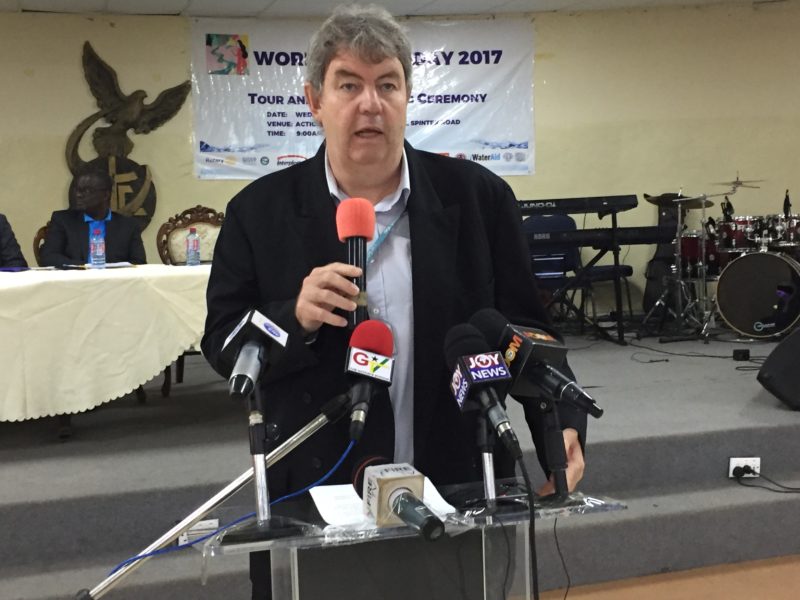A fortnight ago, on Wednesday March 22 2017, Ghana joined the international community to celebrate the World Water Day (WWD). The focus was on raising general awareness of the potential of waste water or sewage as a resource, which if properly handled will immensely benefit nations. Fact is, as society uses more water, the demand on natural water resources is becoming greater. And aspects of this increasing demand for water, especially for agriculture and aqua-culture, can be met by reusing properly treated sewage.

The need for a national realisation and action to transform this “waste to wealth,” was echoed in the statements and messages delivered at a stakeholders briefing session and flag hoisting ceremony to climax the Day’s celebration in Ghana. A statement read on behalf of the Minister for Sanitation and Water Resources, Kofi Ada, called for a “reframing of waste water from being a problem to be disposed of, to being a resource to be valued and exploited.”
The statement hinted that one way of tackling the problem, “is to prioritise closing the gender gap through the promotion of water and waste water efficient technologies that will safeguard the well-being of domestic users particularly women and children because of unequal access to services and resource inputs.”
The statement also alluded to portions of the National Water Policy on the need for interdisciplinary and participatory research that recognises the need for water related technologies, including those for waste and waste water management for the benefit of communities and the environment. It said the government intends to give meaning to these policy directives through practical actions.
These include to employ science and technology as the most economic and efficient ways to recycle waste; ensure that the sanitation and water sector gets the needed investment to upgrade obsolete systems and put in place new systems that will address the many facets of safe water and sanitation delivery; and manage waste in ways as to reduce pollution of water bodies.
In her commemoration message to Ghanaians, the UN Resident Coordinator, Ms. Christine Evens-Klock, said this year’s celebration of World Water Day is a reminder that Ghana can move a step further in reaching all the targets of the Sustainable Development Goal on water by “paying closer attention to the way we treat and dispose of waste water in our homes, farms and industries.”
The Sustainable Development Goals (SDGs), provide a broader global sustainability agenda by 2030. They go further than the Millennium Development Goals (MDGs) they succeeded, in addressing the root causes of poverty and the universal need for development that works for all people.
The targets of the Goal on Water are to achieve universal and equitable access to safe and affordable drinking water for all; attain access to adequate and equitable sanitation and hygiene for all, and end open defecation, paying special attention to the needs of women and girls and those in vulnerable situations; and improve water quality by reducing pollution, eliminating dumping and minimising release of hazardous chemicals and materials, reducing by halve the proportion of untreated wastewater, while increasing recycling and safe reuse.
The others are substantially increase water use efficiency across all sectors and ensure sustainable withdrawals and supply of freshwater to address water scarcity and sustainably reduce the number of people suffering from water scarcity; implement integrated water resources management at all levels including trans-boundary cooperation; and protect and restore water related ecosystems, including mountains, forests, wetlands, rivers, aquifers and lakes.
The UN Resident Coordinator’s message, observed that, “in Ghana, three out of every five persons drink waters contaminated with faeces, risking disease diseases including diarrhoea and cholera.” Her message, which was delivered on her behalf by the UNICEF Ghana’s Chief of WASH (Water, Sanitation and Hygiene), David Duncan, further observed that “diarrhoea causes the death of 3,600 children in Ghana every year and cholera outbreaks frequently occurs in our cities.”
The message noted that while people know the importance of treating water before drinking, “we also need to focus on treating it before disposing of it.” This is because the continual discharge of untreated waste water pollutes water bodies, ground water and coastal water, while the costs associated with wastewater management, “are greatly outweighed by the benefits that include protection of human and public health, environmental sustainability and economic development.”
The message again cited the more direct benefits of waste water management as “biogas, organic fertiliser, industrial cooling water, treated water for irrigation for farms, landscapes, public parks, and residential lawns.”
The chairman for the event was the Director of the Water Research Institute, Dr. Osmund Ansah Asare. He identified part of the problem of waste water as inefficiency and poor management of water systems. Dr. Ansah Asare said disposal of untreated waste water poses sustainability challenges and undermines water security. He called for “an integrated approach to water resources management that can balance different needs in a just manner.”
As part of the climax event, participants at the briefing session also toured the waste water treatment facility at the headquarters of the Action Chapel International Church, in Accra. Rev. Nana Kofi Ahenkorah briefed them about the facility, which has been functioning since its completion in 2015. He listed the benefits as including the use of relatively smaller land space for construction; fast rate digestion of sewerage; treated waste water for irrigating lawns, assuring all year round greenery; generation of biogas that is supplementing LPG in cooking and electricity; and zero emptying of septic tanks, among other things.
The Church’s wastewater treatment facility is one of the few around the country that depicts the feasibility of such facilities on the premises of schools, hospitals, churches, estates, communities, and even in the houses of individuals. As has been stated already, the benefits of this facility greatly outweigh the associated costs, which will depend on the model, size and type of items to be used in the construction.
By Ama Kudom-Agyemang in Accra, Ghana
